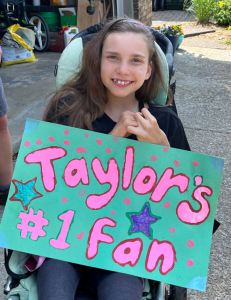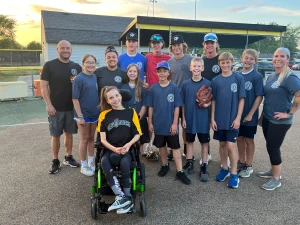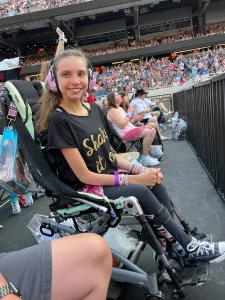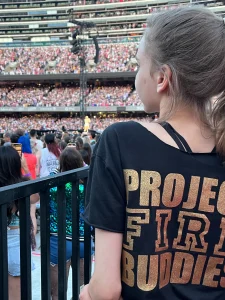DSCC Quality Specialist Honored for Service to Families in Crisis
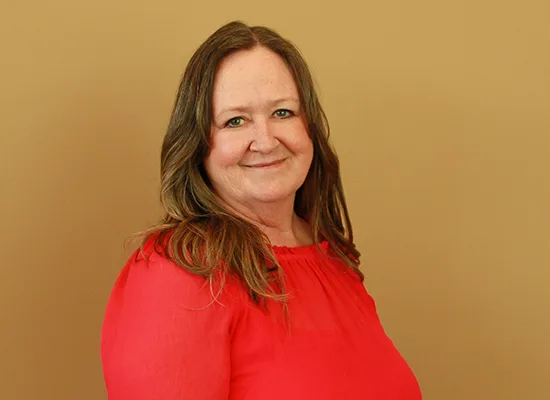
CountyCare awarded Tess Rhodes its Certificate of Excellence for her commitment and dedication
Tess Rhodes is a registered nurse on our Quality Improvement Team. She collaborates with her Division of Specialized Care for Children (DSCC) teammates and partner organizations across Illinois to make sure children in crisis have the right support.
A managed care health plan recently honored Tess for these efforts to protect the safety of children and families.
CountyCare’s Health, Safety and Welfare Team awarded Tess its Certificate of Excellence. The certificate recognizes her “tremendous commitment and dedication” to keeping County Care participants safe and meeting their families’ needs.
Tess said she couldn’t do this important work without DSCC’s care coordination teams and our partners in the community.
DSCC has a contract with CountyCare to provide care coordination to the children and youth with special healthcare needs in its Medicaid managed care health plan.
As a Core/Connect Care Quality Improvement Specialist, Tess helps DSCC’s care coordination teams when a participant enrolled in CountyCare has a critical incident.
Critical incidents are events or situations that create a significant risk of substantial or serious harm to a participant’s physical or mental health, safety or well-being. They can include:
- Abuse or neglect
- Harassment or bullying
- Death of a family member
- Significant injuries
- Medication or treatment errors
- Threat of self-harm
DSCC works with CountyCare to report these incidents and make sure our teams respond to reduce any risks for our participants and help them get the right resources and services they need.
When DSCC team members learn of a critical incident, they must report it to CountyCare within 24 hours of notification.
Tess says it’s important to first ensure that our child/youth is safe and that their family receives the right support for their situation.
Tess and the DSCC care coordination teams work alongside CountyCare staff, the child’s medical team and others to provide access to services and resources.
The DSCC Care Coordinator checks in with the family bi-weekly after a crucial incident to help and monitor the outcome. Tess assists in the process by guiding the participant’s Care Coordinator and providing more resources and materials for education.
Once CountyCare closes a critical incident, Tess continues to monitor the situation and provides final updates at the 30-, 60- and 90-day marks. She also coordinates meetings for all care team members to discuss the incident and develop a plan of support.
“This requires very detailed organizational skills, and Tess never misses an update or chance to help,” her supervisor, Quality Improvement Manager Brandon Bartels, said.
Brandon praised Tess’ “exceptional” communication with CountyCare and her collaboration to keep participants’ and families’ needs at the forefront.
“Tess has received accolades by email from their team multiple times, so this Certificate of Excellence proves not only have they valued her efforts in the past but her continued support for our participants, Care Coordinators, and relationship with CountyCare is truly making an impact,” he said.
Congratulations, Tess! We are grateful for your compassion, teamwork and commitment to children and families!
Share Your Feedback on Illinois’ Plan for Maternal, Child and Family Health

Illinois’ Maternal and Child Health Services Title V Block Grant application is open for public comment until July 21
Illinois families, you have an opportunity to share your input on the state’s latest Maternal and Child Health (MCH) Services Title V Block Grant application and report.
The MCH Title V Block Grant is a federal and state partnership to improve the health and well-being of all mothers, infants and children. The block grant is authorized by Title V of the Social Security Act.
Every state receives MCH Title V Block Grant funds. At least 30 percent of these funds must support services for children and youth with special healthcare needs.
The Division of Specialized Care for Children (DSCC) has managed Illinois’ Title V program for children and youth with special healthcare needs since 1937.
Each year, states must complete an application for future funding and an annual report of our MCH activities from the last federal fiscal year. DSCC has partnered with the Illinois Department of Public Health (IDPH) to help with Illinois’ latest application.
The 2024 MCH Title V Block Grant Application and 2022 Annual Report are posted on the IDPH website. You can also see Illinois’ updated MCH Title V Block Grant Action Plan for 2021-25, which includes the Title V priorities, national performance measures and strategies.
You can share your comments or recommendations on these documents until noon on July 21.
Please send comments to Title V Coordinator Cassidy Chambers at Cassidy.Chambers@illinois.gov.
More details are on the IDPH website.
For more information about DSCC’s Title V role, check out our Fiscal Year 2022 Annual Report.
Project Fire Buddies Helps DSCC Participant Attend Concert of Her Dreams
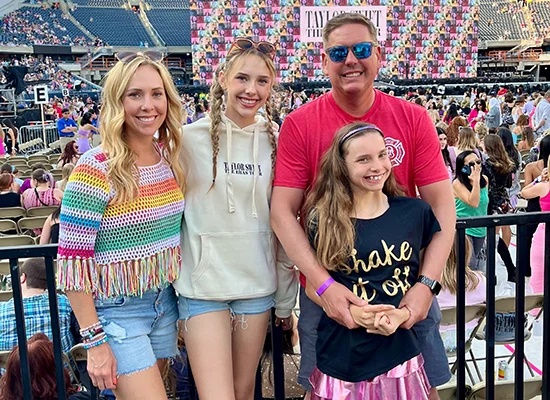
Lily Brown and her entire family saw Taylor Swift perform at Chicago’s Soldier Field
Lily Brown and her family experienced a whirlwind week earlier this month that they won’t soon forget.
The 14-year-old Oak Forest girl graduated from eighth grade. She then played in an adaptive Little League Challenger baseball game.
But the week’s biggest highlight was seeing Lily’s favorite artist Taylor Swift in concert at Soldier Field in Chicago on June 2.
“It was a very special week for all of us,” Lily’s mom, Jennifer Brown, said.
A nonprofit group of Chicago-area firefighters called Project Fire Buddies made the unforgettable concert experience possible.
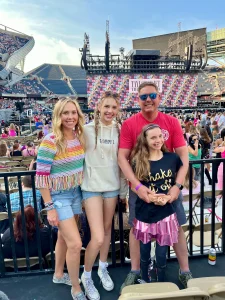
Lily has Rett syndrome, a rare genetic neurological disorder. The condition can severely affect abilities such as speaking, walking, eating and even breathing.
Lily has seizures and uses a wheelchair. Even though she doesn’t speak, she says a lot through her expressive eyes and huge smile.
She is also a participant with the University of Illinois Chicago’s Division of Specialized Care for Children (DSCC). DSCC partners with families to help them find the right services and resources for their child’s special healthcare needs.
In January, Lily turned 14. For her birthday present, Jennifer wanted to take her to see Taylor Swift, who announced her concert tour would include Chicago.
“I took her older sister, Grace, when she was about 9 years old to see Taylor Swift. It was a really special mother and daughter experience,” Jennifer explained. “I wanted Lily and I to have that same experience. Due to the pandemic, Taylor Swift hasn’t toured for a while.”
From the day the tour was announced, they searched for two accessible tickets nearly every day. But their search came up empty. Then, the Oak Forest Project Fire Buddies heard about Lily’s wish to see Taylor Swift.
The Oak Forest Fire Department created Project Fire Buddies in 2016. Its mission is to bring joy to kids struggling with serious illnesses and their families. Volunteers visit the kids throughout the year to deliver gifts for special occasions, play games, read books or just to say “hi” and spend time together.
“We love the fire buddies!” Jennifer said. “We’re so grateful for all that they do. They gave Lily a bike made specifically for her needs so that she can enjoy riding. This year, she’s also playing with the Challenger’s baseball team and enjoyed playing against the Project Fire Buddies team.”
Now, Project Fire Buddies has made Lily’s ultimate birthday wish come true and more.
“Our family usually has to use the divide and conquer approach. We don’t get to attend events together very often,” Jennifer said. “It was an incredible surprise to learn that our Oak Forest Fire Buddies chapter found tickets for our entire family and worked with Soldier Field to have the area accessible for Lily’s wheelchair. We were just blown away.”
Since no “Swifty” can go to a concert without bling, everyone made sure Lily had just what she needed for the big night.
“We made a cute ‘Shake it Off’ shirt with all the sparkle and bling any Swifty would be proud of,” Jennifer said. “We also made a sign, and friends also got her some flashy, light-up flare.”
The Brown’s had an amazing time – together – at the Taylor Swift concert.
“The show was incredible, and Lily loved it,” Jennifer said. “She did have a couple of seizures during the show but bounced back in time to catch her favorite song, ‘Shake it Off.’”
“Project Fire Buddies is hoping to expand to help more kids who are medically challenged or have life-threatening conditions,” Jennifer added. “The Oak Forest chapter is amazing and incredibly generous. They are an important part of Lily’s life, and we are so thankful.”
Visit our Resource Directory to learn more about Project Fire Buddies.
You can also read about the news coverage of Lily’s special concert experience:
Thank you to Project Fire Buddies for making Lily’s wish come true!
Important Reminders: End of Public Health Emergency and Return to In-Person Visits
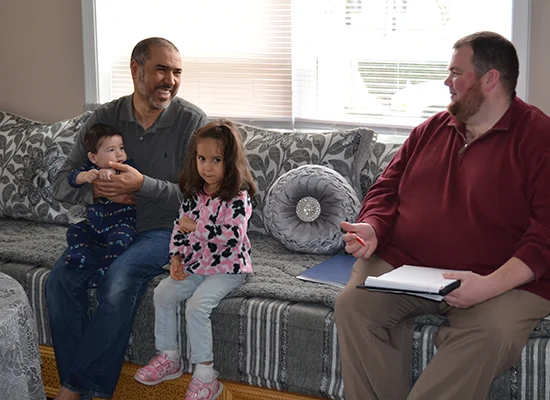
An overview of key changes affecting all Division of Specialized Care for Children participants now that the public health emergency is over
The public health emergency due to the COVID-19 pandemic ended on May 11, 2023.
This ending brings a variety of changes for our Division of Specialized Care for Children (DSCC) participant families. These changes include a return to in-person visits from DSCC Care Coordinators, an end to verbal signatures and more.
The following sections give an overview of key points and important dates to remember:
- Reminders for All DSCC Program Participants
- Reminders for Home Care Program Participants
- Important Medicaid/Insurance Updates for All DSCC Participants in Medicaid
- Contact Reminders for All DSCC Program Participants
Reminders for All DSCC Program Participants
Return to In-Person Visits
Meeting in person with our participants and families is an important part of care coordination. The public health emergency allowed face-to-face visits to occur virtually. Now that the public health emergency has ended, we must return to face-to-face meetings with our participants.
Your DSCC Care Coordinator will work with you in advance to schedule your next in-person/home visit. We understand that in-person visits with your Care Coordinator may be a change for you and your family. We paused these visits for several years during the public health emergency (though many families continued to meet with their Care Coordinator during the pandemic).
Seeing you in person helps us get to know you and your family better. It can also help improve your connection with your DSCC Care Coordinator. Our partnership with Medicaid and Medicaid managed care plans also requires us to meet with you in person. If you have any concerns about in-person visits, please talk to your Care Coordinator. We will work with you to see how to best accommodate your preferences.
Verbal Signatures
The public health emergency allowed your Care Coordinator to receive necessary signatures verbally. As of May 11, 2023, it is a federal rule that DSCC can no longer accept verbal signatures.
- Electronic signature options (such as through Adobe) remain an option for families when signing DSCC documents.
Reminders for Home Care Program Participants
End of Continued Medicaid and Program Enrollment for Those Found Ineligibile for Services
Starting April 1, 2023, DSCC began working with the Illinois Department of Healthcare and Family Services (HFS) to reassess all Home Care Program participants who received a notice of ineligibility for the program since March 1, 2020. Now that the public health emergency has ended, HFS’ notices accurately list the approved level of services for you or your child.
- If you or your child received a notice of ineligibility for services since March 1, 2020, your services will remain in place until HFS completes a reassessment. The reassessment looks at your updated and current medical documentation and will occur before Sept. 30, 2023.
- If you or your child received a notice of reduced nursing hours since March 1, 2020, your Care Coordinator will complete the next reassessment of services at your regularly scheduled renewal time. Services will remain in place until this reassessment occurs.
Reminders for Individuals in the Non-Waiver Program (Nursing and Personal Care Services)
Now that the public health emergency has ended, all individuals who turn 21 and are not on the Home and Community-Based Services Waiver for Those Who Are Medically Fragile Technology Dependent (MFTD), will not be eligible for services. If you or your child were on non-waiver services and turned 21 between the dates of March 1, 2020, and March 31, 2023, services will end on Sept. 30, 2023. Your Care Coordinator will work with you to ensure you or your child is set with an alternate state waiver, such as the Division of Rehabilitative Services (DRS), if applicable.
For all non-waiver participants under age 21, you must continue to have Medicaid coverage to receive Home Care services. It is important that you submit the redetermination form from Medicaid to keep your coverage. If you fail to meet Medicaid eligibility or do not respond in time, HFS will cancel your Medicaid case. Your Home Care services will then also end.
Additional COVID-19 Respite Allotment
During the public health emergency, HFS approved an additional 336 hours of respite to use before the regular respite allotment. This additional respite is for all Home Care MFTD waiver participants. Starting Nov. 11, 2023, this additional COVID respite will expire. All respite used after Nov. 11, 2023, will come from the standard respite allotment.
Personal Protective Equipment (PPE)
During the public health emergency, nursing agencies were reimbursed for PPE when actively staffing nurses in the home. The PPE is for the nurses to use while caring for participants. This reimbursement of PPE supplies to the nursing agencies will end on Nov. 11, 2023.
Nursing Supervisory Visits
Nursing agencies resumed in-person supervisory visits in November 2020. Effective May 11, 2023, there can be no exceptions to replace in-person supervisory visits.
Important Medicaid/Insurance Updates for All DSCC Participants in Medicaid
These next sections explain important Medicaid updates now that the public health emergency and continuous Medicaid coverage period has ended. The end of the public health emergency may also affect your Medicaid coverage or your private health insurance coverage.
No More Copays or Premiums for Medicaid
Most Medicaid programs no longer have premiums or copays. All Kids Assist, Aid to the Aged Blind and Disabled (AABD) and Adult Medicaid do not have monthly premiums or copays for services. All Kids Premium 1, Premium 2 and Share programs are all called All Kids Assist now.
Medical Redetermination for Medicaid
Redetermination is when Medicaid looks to see if you are still eligible. They look at your residency, monthly income and other criteria to decide if you still qualify.
Medicaid sent forms to some members as early as May 2023. They will not complete redetermination on all cases at the same time. They will make the redeterminations over several months. This means that your Medicaid redetermination could happen now or later, even next year. It is important to make sure Medicaid has your current address. You can report your address online at Medicaid.illinois.gov or call (877) 805-5312. We also have a news post with more details about how to update your address.
Please watch your mail for letters from Medicaid.
Once you receive your redetermination notice, you will have about a month to respond. Medicaid may ask for more information about your income, residency or other information. If Medicaid asks for more information and you do not respond, your Medicaid coverage ends. You can return the redetermination in several ways:
- Online at ABE.illinois.gov using Manage My Case. Manage My Case is the quickest way to complete your redetermination.
- By mail.
- In person at a local Illinois Department of Human Services (DHS) Family Community Resource Center.
- By phone.
If you are in a Medicaid managed care plan (MCO), please remember the MCO does not do the redetermination. Medicaid does redetermination reviews. If you do not qualify for Medicaid anymore, your coverage ends. If you are still eligible, you keep your Medicaid coverage.
Don’t risk losing your health insurance. Please update your address with Illinois Medicaid. It’s easy, fast and free:
- Call (877) 805-5312 from 7:45 a.m. to 4:30 p.m., Monday through Friday.
- Visit medicaid.illinois.gov.
- If you use a TTY, call (877) 204-1012.
Please contact your DSCC Care Coordinator if you have questions about Medicaid redetermination.
Telehealth Coverage
Telehealth coverage for Medicaid (and other insurances) is a permanent change and will continue after the public health emergency to give Medicaid time to review for any future changes. You can review the HFS Provider Notice issued May 9, 2023, on Telehealth to learn more.
An Illinois law signed in 2021 requires insurance to cover telehealth through 2027. This law does not require that practitioners or providers offer telehealth services. Therefore, your providers may not offer telehealth care. The law only says that insurance must pay providers for telehealth care if they provide it.
Pharmacy Billing and Prior Approval Requirements
Pharmacy billing and prior approval requirements for Medicaid will resume. There were many flexibilities that allowed Medicaid members to get medications. These include overriding the refill too soon and waiving requirements for the preferred drug list, quantity and brand limits. If you go to the pharmacy and they tell you that you can’t get your medications, ask your doctor to submit a prior approval to Medicaid. You can review the HFS Provider Notice issued May 3, 2023, on Pharmacy Billing to learn more. Contact your DSCC Care Coordinator for more help.
DME and Therapy Prior Approval Requirements
DME and therapy prior approval requirements for Medicaid will resume. There are some services that Medicaid did not require a prior approval for during the public health emergency. These services include therapy, home health and some durable medical equipment (DME). It is important for your providers to get a prior approval so that Medicaid reviews medical eligibility for the services. You can review the HFS Provider Notice issued April 4, 2023, on Prior Approval Requirements for more details. Contact your DSCC Care Coordinator for more help.
COVID-19 Tests, Treatment, and Vaccines
Uninsured individuals will no longer get access to special COVID-19 Medicaid eligibility which included testing, services, treatment, and vaccine administration during the public health emergency. You can view the HFS Provider Notice issued May 9, 2023, on Uninsured Population Special COVID-19 Coverage. Medicaid members who do have eligibility will continue to be able to access treatment, testing and vaccines.
Those with private insurance should also be able to continue to access treatment and vaccines as outlined by their plan.
Insurance plans will no longer cover over-the-counter tests for COVID-19 for free. Generally, a doctor will need to order the test and provide them in an office or similar facility. This may vary from plan to plan. You should call your insurance plan if you have questions. There may also be community organizations or public health departments still distributing COVID-19 tests and related services, such as vaccines, for free.
Extension of COBRA
During the public health emergency, there was an extension of election and notice deadlines for someone to take COBRA after losing or leaving a job. That will expire 60 days after May 11, 2023.
Temporary Special Enrollment Period
For individuals who no longer qualify for Medicaid after they go through redetermination, there is a special open enrollment period through the federal health insurance marketplace to purchase private insurance. It will extend from March 31, 2023, to July 31, 2024. This is only for people with a special qualifying event, such as losing coverage. Otherwise, the regular open enrollment period will be in November and December for individuals who need to enroll in private insurance through the marketplace. The Illinois website is GetCovered.illinois.gov and the federal website is HealthCare.gov.
Questions? Contact Us!
As a DSCC participant family, you can contact us with any questions or support your family needs.
Please note the best way to reach your care coordination team or any DSCC office is through our toll-free number of (800) 322-3722.
You can use this number to dial your Care Coordinator’s direct extension or to have our Customer Service Representatives connect you with the right person/team.
We have updated our phone system and ask everyone to use the (800) 322-3722 number as the simplest and fastest way to reach us.
Our office hours are 8 a.m. to 4:30 p.m. Please talk to your Care Coordinator if you have a need to speak outside of business hours.
You may also reach us through our general dscc@uic.edu inbox or use our Contact Us or Request a Callback forms on our website.
Please talk with your Care Coordinator if you have more questions or need to update your communication preferences.
We are thankful for your partnership throughout the changes related to the end of the pandemic and public health emergency. Our team will continue to help support your family and connect you with the right services and resources.
Upcoming Education and Scholarship Opportunities for Young Adults with Disabilities
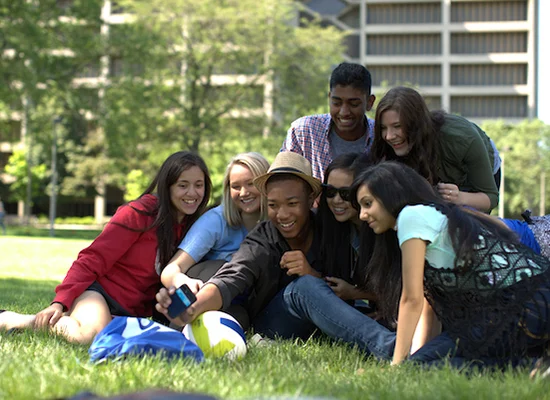
Learn more about the Illinois Community College Initiative and 2023 CSBG Scholarship Program
Finding the right programs and resources is key when planning for the future as a young adult with disabilities.
Two programs currently offer valuable education, training and scholarship opportunities for Illinois youth interested in college or joining the workforce after high school.
Illinois Community College Initiative
The Illinois Department of Human Services’ Division of Rehabilitation Services (DRS) wants to help people with disabilities in their quest for success.
The Illinois Community College Initiative provides academic and vocational training programs for eligible students with disabilities at in-state public community colleges and approved community colleges bordering the state.
People with disabilities who are eligible for the DRS vocational rehabilitation program are eligible to participate. You may complete community college coursework leading to an associate degree or to a degree, certificate or other industry-recognized credential or certificate.
DRS will help you with:
- Tuition
- The cost of fees, books and supplies
- Transportation costs
- Other eligible costs
See the Illinois Community College Initiative flyer for more details.
Spanish-speaking families can listen to the radio ad or read the ad transcript in Spanish.
Ready to get started? Contact your local DRS office using the locator tool or call (877) 581-3690. TTY and relay callers can dial 711.
2023 C.E.F.S. Economic Opportunity Corporation’s CSBG Scholarship
C.E.F.S. Economic Opportunity Corporation has a scholarship program to help students pay for college or occupational training.
The CSBG College Scholarship program provides financial help to income-eligible students living in the following counties:
- Christian
- Clay
- Effingham
- Fayette
- Montgomery
- Moultrie
- Shelby
You can use the scholarship to pay for formal education or occupational training in an accredited Illinois educational institution. Training and degrees may include:
- Associate, bachelor’s or master’s degree, post-secondary education
- General education, short-term training (two years or less) in growth occupation skills
The CSBG scholarship is competitive and awards students based on:
- Income
- The interview process
- Choosing to go into high technology areas or other growth occupations
Previous scholarship recipients can submit an application. You must be enrolled or intend to enroll as full-time students for the fall 2023 semester in an Illinois-accredited college. Full-time is 12 hours or more.
Click on the CSBG Scholarship application or get an application at your county C.E.F.S. outreach office. The application includes contact information for each local office.
You can also visit the C.E.F.S. website for more information.
You must complete your application and submit all requested documents to your local office by April 14 at 4 p.m.
All eligible candidates will have an interview in May.
Find More Transition Resources
Visit the Transition Tools section of our website to find more programs and information to help with planning and paying for college, getting a job and more.
You can browse the Transition: Education Resources and the Transition: Work Resources categories to find what you need.
Our team is also here to help partner with you and your family to help make the transition to adulthood as successful as possible.
Contact us to find out more!
2023 Summer Camp Opportunities for All Ages and Abilities

Check out our list of inclusive camps to help you find the right fit for your child
It’s never too early to start planning for summer break activities.
Fortunately, there are a variety of opportunities for children and young adults with special healthcare needs.
We’ve compiled a list of day and overnight camps across Illinois as well as virtual programs.
Does your child want to make new friends? Develop new skills? Meet others with their condition or become more independent?
Our 2023 summer camp list can help you find the right fit.
These camps are accessible and inclusive for a variety of needs, including many of our program’s eligible medical conditions.
Our events calendar shows the summer camps listed by date. You may also search for events in your area by clicking on a regional office near you.
Know of a good summer camp opportunity to add to our list?
Send us the details at dscc@uic.edu. We’ll continue to update our list of camps and activities, so please check back often.
Important Updates on the End of Continuous Medicaid Coverage and Appendix K

Key dates to know and an overview of the impact on DSCC participants and families
We are starting to prepare for the end of the public health emergency due to the COVID-19 pandemic. We’ve put together important information about how it will affect our Division of Specialized Care for Children (DSCC) participants and their families.
When the public health emergency took effect in 2020, the federal government allowed continuous Medicaid coverage and flexibilities for individuals receiving services through a Medicaid waiver. The federal government has signaled that the public health emergency will end on May 11, 2023. Please note the federal Centers for Medicare and Medicaid has not yet confirmed this date in writing.
We want to keep our participants as up-to-date as possible and will let you know if this date changes. In the meantime, we want to explain what changes will occur once the public health emergency and continuous Medicaid enrollment end.
The following sections give an overview of:
- The end of continuous Medicaid coverage
- The changes for all DSCC participants and families
- The impact on those enrolled in the Home Care Program
End of Continuous Medicaid Coverage
When the public health emergency began in 2020, the federal government allowed for continuous Medicaid coverage. This flexibility meant no one would lose Medicaid coverage during this time. The federal government is now ending continuous Medicaid coverage on March 31, 2023.
Starting April 1, Illinois Medicaid must review eligibility for all Medicaid cases. This process is called redetermination. Redetermination is when Medicaid looks to see if you are still eligible. They look at your residency, monthly income and other criteria to decide if you still qualify.
Medicaid will send forms to some members as early as May 2023. They will not complete redetermination on all cases at the same time. They will make the redeterminations over several months. This means that your Medicaid redetermination could happen in May or later this year.
It is important to make sure Medicaid has your current address. You can report your address online at Medicaid.illinois.gov or call (877) 805-5312. We also have a news post with more details about how to update your address. Please watch your mail for letters from Medicaid.
Once you receive your redetermination notice, you will have about a month to respond. Medicaid may ask for more information about your income, residency, or other information. If Medicaid asks for more information and you do not respond, your Medicaid coverage ends. You can return the redetermination in several ways:
- Online at ABE.illinois.gov using Manage My Case. Manage My Case is the quickest way to complete your redetermination.
- By mail.
- In person at a local Illinois Department of Human Services (DHS) Family Community Resource Center.
- By phone.
If you are in a Medicaid managed care plan (MCO), please remember the MCO does not do the redetermination. Medicaid does redetermination reviews. If you do not qualify for Medicaid anymore, your coverage ends. If you are still eligible, you keep your Medicaid coverage.
Don’t risk losing your health insurance. Please update your address with Illinois Medicaid. It’s easy, fast and free:
- Call (877) 805-5312 from 7:45 a.m. to 4:30 p.m., Monday through Friday.
- Visit medicaid.illinois.gov.
- If you use a TTY, call (877) 204-1012.
Please contact your DSCC Care Coordinator if you have questions about Medicaid redetermination.
Changes for All DSCC Program Participants:
- In-Person Visits: The public health emergency has allowed flexibility for in-person visits. As the public health emergency ends, DSCC must resume all in-person visits by Nov. 11, 2023. Your DSCC Care Coordinator will work with you to schedule your next in-person/home visit.
- Verbal Signatures: The public health emergency also allowed your Care Coordinator to receive necessary signatures verbally. As the public health emergency ends, we can no longer accept verbal signatures beginning May 11, 2023.
Impact on DSCC Participants in the Home Care Program:
The COVID-19 public health emergency has allowed several flexibilities for those in the Home Care Program in two separate areas:
- Continuous Medicaid and program enrollment for those found ineligible for services beginning March 1, 2020
- Appendix K flexibilities (Appendix K is an emergency coverage document for individuals receiving services through a Medicaid waiver.)
The following is important information about how the end of the public health emergency will affect Home Care Program participants.
End of Continued Medicaid and Program Enrollment for Those Found Ineligible for Services:
- There have been no reductions or loss of eligibility for Home Care participants since March 1, 2020. In 2022, the federal government separated the continuous Medicaid enrollment coverage provision from the public health emergency. As a result, continuous Medicaid coverage will end on March 31, 2023.
Starting April 1, 2023, DSCC will work with the Illinois Department of Healthcare and Family Services (HFS) to determine eligibility. We will reassess all Home Care Program participants who received a notice of ineligibility for the program since March 1, 2020. If you or your child received a notice of ineligibility for services since then, your services will remain in place until we complete a reassessment. The reassessment will look at your updated and current medical documentation. This includes individuals who appealed and were still deemed ineligible for services. Based on the new reassessment, HFS will send you an updated notice. This notice will state whether you or your child are eligible for Home Care services. Your DSCC Care Coordinator will work with you to complete a reassessment before Sept. 30, 2023.
- If you or your child received a notice of reduced nursing hours since March 1, 2020, your Care Coordinator will complete the next reassessment of services at your regularly scheduled renewal time. Services will remain in place until this reassessment occurs. After this reassessment, HFS will send you a new notice based on updated and current medical documentation. The notice will list the new level of services.
More Information for Individuals in the Non-Waiver Program (Nursing and Personal Care Services):
- You will no longer receive Home Care Program nursing services if you or your child turned 21 and are not on the MFTD waiver but still receive nursing. Your nursing services will end on Sept. 30, 2023. Your Care Coordinator will work with you to ensure you, or your child is set with an alternate state waiver, such as the Division of Rehabilitation Services (DRS), if applicable. If you or your child will turn 21 on or after March 31, 2023, services will end on the date indicated on the current notice of ineligibility.
- For all non-waiver participants under age 21, you must continue to have Medicaid coverage to receive Home Care services. It is important that you submit the redetermination form from Medicaid to keep your coverage. If you fail to meet Medicaid eligibility or do not respond in time, HFS will cancel your Medicaid case. Your Home Care services will then also end. For more information on the Medicaid redetermination timeline, see the dates above.
Appendix K Flexibilities
Appendix K is an emergency coverage document for individuals receiving services through a Medicaid waiver. Appendix K provisions took effect on March 1, 2020, to give flexibility to Home Care participants. Appendix K is tied to the public health emergency, which is determined by the federal government.
As we noted above, the federal government has indicated the public health emergency will end on May 11, 2023. Appendix K provisions would then continue for six months after the public health emergency ends. Therefore, Appendix K flexibilities will end on Nov. 11, 2023. However, DSCC worked with HFS to make two flexibilities permanent. Here are more details on what will change and what will remain in place:
- Licensed (RN or LPN) parent/LRA paid caregivers: Parents/legally responsible adults (LRAs), including foster parents, can continue to provide skilled nursing services to their child if they hold an active registered nurse (RN) or licensed practical nurse (LPN) license. DSCC sent a separate notice on this provision remaining permanent, which includes details on guidelines. (You can also read our news post on Home Care Program Changes Give Families More Flexibility and Support.)
- Overtime: Nursing agencies will permanently receive payment for providing overtime hours to Home Care participants. DSCC sent a separate notice on this provision remaining permanent, which includes details on guidelines. (You ou can also read our news post on Home Care Program Changes Give Families More Flexibility and Support.)
- Additional COVID-19 respite allotment: During the public health emergency, HFS approved an additional 336 hours of respite to use before the regular respite allotment. This additional respite is for all Home Care MFTD waiver participants. Starting Nov. 11, 2023, this additional COVID respite will expire. All respite used after Nov. 11, 2023, will come from the standard respite allotment.
- Personal Protective Equipment (PPE): During the public health emergency, nursing agencies were reimbursed for PPE when actively staffing nurses in the home. The PPE is for the nurses to use while caring for participants. This reimbursement of PPE supplies to the nursing agencies will end on Nov. 11, 2023.
- Nursing Supervisory Visits: Nursing agencies resumed in-person supervisory visits in November 2020. Effective May 11, 2023, there will be no exceptions allowed to replace in-person supervisory visits.
Please contact your DSCC Care Coordinator at (800) 322-3722 if you have questions or are unsure how this information may impact your family.
We are thankful for your partnership throughout the pandemic and public health emergency. Our team will continue to help support your family and connect you with the right services and resources.
Meet Medical Advisory Board Member Dr. Shubhra (Sue) Mukherjee

“DSCC understands the importance of supporting families and coordinating care.”
Dr. Shubhra Mukherjee, also known as Dr. Sue, is the medical director of pediatric and adolescent rehabilitation medicine at Shriners Children’s Chicago.
Mukherjee currently cares for patients up to age 22. Her background includes working with young adults with complex healthcare needs and collaborating across medical specialties to help these patients and their families connect with the care they need.
She has served on the Division of Specialized Care for Children’s (DSCC) Medical Advisory Board (MAB) for more than 16 years.
Mukherjee’s expertise in physical medicine and rehabilitation combined with a deep interest in the transition of care for children with complex healthcare needs has been a great fit.
“DSCC understands the importance of supporting families and coordinating care,” said Mukherjee. “I appreciate their statewide focus and how the MAB serves as an avenue for clinician input on what changes are needed, sharing feedback about the struggles we encounter helping patients get what they need, and working together to find solutions.”
Putting the Focus on Transition
When Mukherjee joined the board, schools were just beginning to explore the need to help students build the skills needed to transition to adulthood.
“They were looking at ways they could better prepare students to go on to jobs, college and life after high school,” Mukherjee explained. “In pediatric care, we realized that we needed to be doing the same thing for children with complex healthcare needs and their families.”
The DSCC team had the idea to increase the participation of medical professionals at the annual Illinois Statewide Transition Conference. We wanted to create a more proactive approach to helping children and their families make the transition from pediatric care to adulthood.
Mukherjee teamed up with DSCC’s former Title V Transition Specialist Darcy Contri to help put the idea into action.
“DSCC was already doing great work providing family support, tip sheets, and facilitating face-to-face conversations about transition. This was just one more piece of the puzzle,” said Mukherjee. “Darcy and I set up the first health care track for the Statewide Transition Conference with a goal of building more clinical engagement and increasing awareness and support for patients with complex health care needs and their families.”
The health care track has provided information and presentations with and for doctors and others providing complex care. According to Mukherjee, it continues to be a catalyst for building connections, sparking ideas, and inspiring healthcare professionals.
“I got to see that impact firsthand when one of our occupational therapists (OT) attended the conference with me,” Mukherjee said. “She was so moved that she became a big proponent of the OT’s role in developing and teaching adolescents skills related to health care.”
Opportunities to Collaborate
Mukherjee appreciates how the MAB fosters collaboration, networking and the development of partnerships. This work continues to create more options throughout Illinois for patients with complex care needs.
“It’s very rewarding to grow my knowledge and connect with like-minded professionals across so many different specialties,” Mukherjee said. “We’re able to share, provide feedback, and exchange ideas around removing barriers and supporting patients with complex healthcare needs at all stages.”
Mukherjee said DSCC also continues to be a major source of support for her own patients.
“Care coordination is so important for these families,” said Mukherjee. “DSCC helps them find the right care or specialist, get to appointments, and locate funding for the services they need to stay well and engage in their community. DSCC is there for the child and family.”
Mukherjee also leans on DSCC for updates and information.
“DSCC helps me keep track of program changes and learn about new services or programs that are available,” Mukherjee emphasized. “DSCC plays a vital role in sharing information and connecting the many different entities that individuals with complex needs depend on for their care.”
Awareness Brings Progress
Mukherjee said there is still a great need for education about the transition to adulthood and its importance.
“I’m glad to see the growing awareness and interest by professionals in helping youth develop the skills they need to be successful as adult users of the healthcare system,” said Mukherjee. “We are seeing more adult providers who understand the needs of young people with disabilities who are aging out of pediatric care.”
Awareness has brought progress, but challenges remain.
“Pediatric and adult care are not set up in the same way. For example, a spina bifida clinic and spinal care clinic are similar, but they are not the same. Adults with complex conditions going to a spinal care clinic may not be getting all of their needs met,” said Mukherjee. “The special pediatric clinic that addressed all their needs as a kid doesn’t exist in the adult care system.”
Mukherjee’s own focus on the transition to adulthood remains as strong as ever.
“I’ve been following some of the research initiatives at the University of Illinois Chicago. It’s exciting to see they are collecting data, exploring different aspects of complex care and its costs, and working towards building a framework that brings all the pieces together for adults with complex care needs,” she said.
“DSCC plays a vital role,” Mukherjee noted. “Sharing their information and ensuring it’s always there for the families we serve is important.”
Thank you, Dr. Sue, for your leadership to help families and professionals support the successful transition to adulthood!
Visit our Medical Advisory Board page to learn more about the MAB and its mission.
Sensory-Friendly Easter Bunny Visits

Hippity-hoppity, the Easter Bunny is on its way!
Sensory-friendly Easter Bunny visits are happening at sites throughout Illinois and the St. Louis area. Individuals of all ages and abilities may schedule an appointment.
The visits will take place in a calmer, quieter environment that supports visitors’ sensory, physical and developmental needs. Autism Speaks is partnering with Cherry Hill Programs to provide these special Easter Bunny photo events.
The Bunny Cares experiences are free. Photos will be available to buy at each event.
You can see the Easter Bunny on March 26 at the following locations (in the “Reserve” section for each location, click on the “Events” button and select “Bunny Cares”):
- Fox Valley
- Frontenac Plaza (Missouri)
- Hawthorn Mall
- Market Place Shopping Center
- Northwoods Mall
- Orland Square Mall
- White Oaks Mall
- Woodfield Mall (also hosting an event on April 2)
Reservations are limited. Visit the Bunny Cares website for a complete list of sites and to reserve your spot.
Many communities are also hosting sensory-friendly egg hunts and opportunities to meet the Easter Bunny. To find these events and other family-friendly spring activities, hop on over to our Special Events page.
New Health Insurance Education Series Open to All DSCC Families
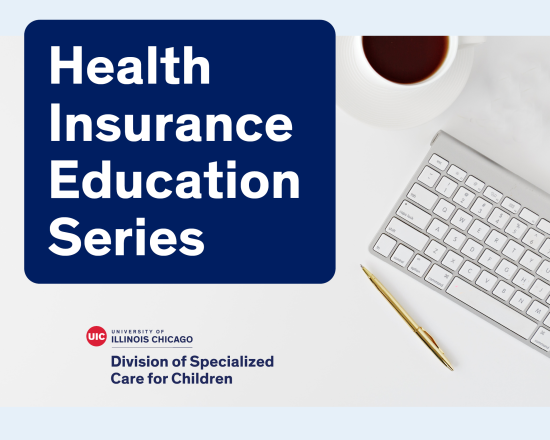
Free virtual training sessions in English and Spanish for Division of Specialized Care for Children participants, their families and all who are interested
Navigating the health insurance maze can be frustrating.
We’ve heard our participant families’ feedback and want to help improve the process.
Please join the University of Illinois Chicago’s Division of Specialized Care for Children (DSCC) for our new education series on important health insurance topics.
These free, family-focused sessions will help you better understand your coverage and benefits.
Sessions are virtual and open to DSCC participants, their families/caregivers and anyone interested in these topics.
The DSCC Health Insurance Education Series is the result of DSCC families’ questions and suggestions from our Family Advisory Council.
Our Benefits Management and Research (BMR) team will explain a different topic and answer your questions each month. They will present each session in English and in Spanish via Zoom.
Save the date for each session:
- Understanding Your Insurance
English: March 7, 6 p.m.
Spanish: March 8, 6 p.m.This training will help you understand your health insurance. It will go over the types of insurance plans and some important words to know. You will also learn what to do if you have many insurance plans and how to find a doctor.
Sign up for Understanding Your Insurance in English
Sign up for Understanding Your Insurance in Spanish
- Medicaid Eligibility and Coverage
English: April 11, 6 p.m.
Spanish: April 12, 6 p.m.This training will help you learn about Illinois Medicaid programs. It will discuss who can have Medicaid and the programs for children and adults. You will learn what Medicaid covers and how to keep Medicaid coverage through the yearly redetermination process.
Sign up for Medicaid Eligibility and Coverage in English
Sign up for Medicaid Eligibility and Coverage in Spanish
- Insurance Appeals
English: May 9, 6 p.m.
Spanish: May 11, 6 p.m.This training will cover information on health insurance appeals. You will learn what to do if your insurance doesn’t approve a service. You will also learn more about the appeal process and how to write an appeal letter. Examples will be available.
Sign up for Insurance Appeals in English
Sign up for Insurance Appeals in Spanish
Details about each series session are also posted on our Events page.
Each session will be recorded. You can access the recordings and related materials on our Family Education Webinars page.
There is no cost for families to participate.
If you have questions before or after a session, please email dscc@uic.edu or fill out our Contact Us form.
We hope you’ll join us!



